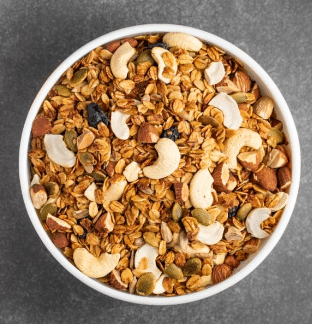

Photo by Milad Fakurian on Unsplash
Mental disorders have traditionally been explained by alterations in the functioning of the brain, however, today it is known that it is not only the brain but also the gut and the bacteria that inhabit it (known as the gut microbiota) play a significant role in influencing mental health.
In this article we will explore the gut-brain axis, the role of the gut microbiota in mental health, and how to take advantage of this gut-brain communication to combat conditions such as anxiety and depression.
Gut-brain Axis
The gut-brain axis consists of a bidirectional communication pathway between the central nervous system and the enteric nervous system (a set of neurons in charge of intestinal regulation and activity). Besides the intestine and the brain, several other factors play a role in this communication, including the endocrine system, the immune system, and the intestinal microbiota.
Thanks to this axis between the gut and the brain, the gut microbiota can modify mood or cognitive functions such as attention, concentration, and memory. This suggests the potential for complementing the treatment of some neuropsychiatric conditions with dietary modifications and the utilization of probiotics and prebiotics.
Gut microbiota and mental health
It is estimated that about 60% of people with anxiety or depression have some form of alteration in intestinal function. The bacteria that commonly colonize the intestine are responsible for proper intestinal function but also affect mental health. This explains why mood disorders go hand in hand with gastrointestinal dysfunctions.
Some gut microbiota functions related to mental health are:
– The gut microbiota is involved in the metabolism and regulation of glutamate levels, which is essential for learning and memory and the main CNS stimulatory neurotransmitter.
– On the other hand, Lactobacillus spp. and Bifidobacterium spp. participate in the synthesis of GABA, an inhibitory neurotransmitter that induces a feeling of calm and helps reduce anxietysymptoms.
Escherichia spp., Candida spp., Enterococcus spp. they secrete serotonin, the so called happiness hormone, which deficiency is related to depression. The presence of Bifidobacterium infantis affects the metabolism of tryptophan (the serotonin precursor) causing its levels to increase.

–Bacillus spp. and Serrattia spp. are involved in the production of dopamine, the so-called pleasure hormone.
All these substances fulfill communication functions in the gastrointestinal tract, but they also act in the rest of the body and when found at the appropriate levels they favor the perception of well-being and reduce the symptoms of mental illness. As you can see, the gut microbiota must be both diverse and balanced to ensure that each process and each substance is present in the correct proportion.
Probiotics for a diverse and balanced gut microbiota

Photo by Tiard Schulz on Unsplash
According to the WHO, probiotics are live microorganisms (bacteria or yeast) that, ingested in adequate amounts, offer a health benefit for those who consume them. These help to improve or maintain a healthy gut microbiota, reducing both oxidative stress and the production of pro-inflammatory substances, which are related to mood disorders.
Probiotics are especially useful for treating neuropsychiatric conditions related to intestinal wall permeability such as autism spectrum disorder, anxiety disorder, depression disorder, schizophrenia, and bipolar disorder. Studies have found that regular consumption of probiotics containing B. longum, Bifidobacterium animalis lactis, Lactobacillus bulgaricus, Streptococcus thermophilus, L. lactis, and L. helveticus reduce stress and alleviate symptoms of anxiety and depression.
Prebiotics to nourish the gut microbiota
Prebiotics are found mostly in fiber-rich foods that are not digested by the person who consumes them, but instead serve as nutrients for the bacteria that make up the intestinal microbiota. Some prebiotic foods are garlic, onion, artichokes, asparagus, fortified cereals, fruits and vegetables. Including them in the diet favors the maintenance of a healthy and functional intestinal microbiota.
Other specific examples of prebiotics are fructo-oligosaccharide (FOS) and galacto-oligosaccharide (GOS), these are nutrients for Bifidobacterium and Lactobacillus. Studies indicate that including these prebiotics in the diet of anxious or depressed patients, result in a reduction in cortisone levels (induced by stress) as well as in behaviors related to anxiety and depression.

Photo by ABHISHEK HAJARE on Unsplash
In the same way that probiotics and prebiotics favor the maintenance of a healthy gut microbiota, factors such as alcohol consumption, smoking, stress and a sedentary life negatively affect it and have an impact on our mental health.
For personalized advice, consult with a healthcare specialist to learn more about enhancing your mental health through the gut-brain axis.
Edited by: Maddison Henley, PA-C
Other Blog Posts in
Animo Sano Psychiatry is open for patients in North Carolina, Georgia and Tennessee. If you’d like to schedule an appointment, please contact us.
Get Access to Behavioral Health Care
Let’s take your first step towards. Press the button to get started. We’ll be back to you as soon as possible.ecovery, together.




